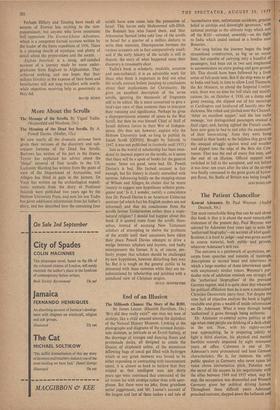End of an Illusion
The Millionth Chance: The Story of the R101.
By James Leasor. (Hamish Hamilton, 18s.) 'Bur did they really exist?' one may say now of airships, like a child amazed among the diplodoci of the Natural History Museum. Looking at the photographs and diagrams of the stressed duralu- min skeleton, as intricate as an Emett fantasy, at the drawings of lounges and dancing floors and promenade decks, all designed to create the illusion of shipboard safety, of the monstrous billowing bags of cmcal gut filled with hydrogen which at any given moment was bound to be either expanding or contracting with inconvenient speed, it is almost as hard to believe that they existed as that intelligent men not thirty years ago were convinced that command of the air routes lay with airships rather than with aero- planes. But these were no joke, those grandiose aerial juggernauts, and Mr. Leasor's account of the largest and last of them makes a sad tale of
'inconclusive tests, unfortunate accidents, genuine belief in airships and downright ignorance,' with national prestige as the ultimate bogy which sent off the R101—untested, unwieldy—on the flight to India which ended instead in a bonfire near Beauvais.
Not long before the journey began the huge streamlined construction, as big as an ocean liner, but capable of carrying only a handful of passengers, had been cut in two and lengthened to accommodate an extra gasbag and gain greater lift. This should have been followed by a fresh series of full-scale tests. But if the ship were to get to India and back in time to allow Lord Thomson, the Air Minister, to attend the Imperial Confer- ence, there was no time for full trials and modifi- cations. So, on October 4, 1930, on a damp and gusty evening, she slipped out of her moorings at Cardington and lumbered off heavily into the darkness. She rolled and pitched over the Channel. 'After an excellent supper,' said the last radio message, 'our distinguished passengers smoked a final cigar, and, having sighted the French coast, have now gone to bed to rest after the excitement of their leave-taking.' Soon they were being roasted in their bunks as the helpless ship gave up the unequal struggle against wind and weather and dipped into the edge of the Bois des Cou- tumes. That was the end of many fine men, and the end of an illusion. Official support was switched in full to the aeroplane, and not before it was time; ten years after the idea of the airship was finally consumed in the great gouts of hydro- gen flame, the Battle of Britain was being fought.
LAIN HAMILTON






























 Previous page
Previous page